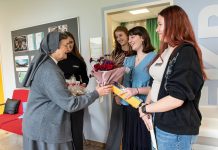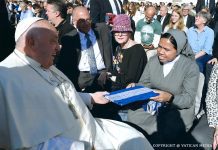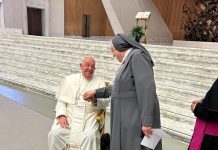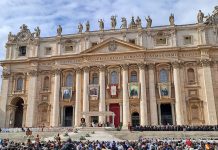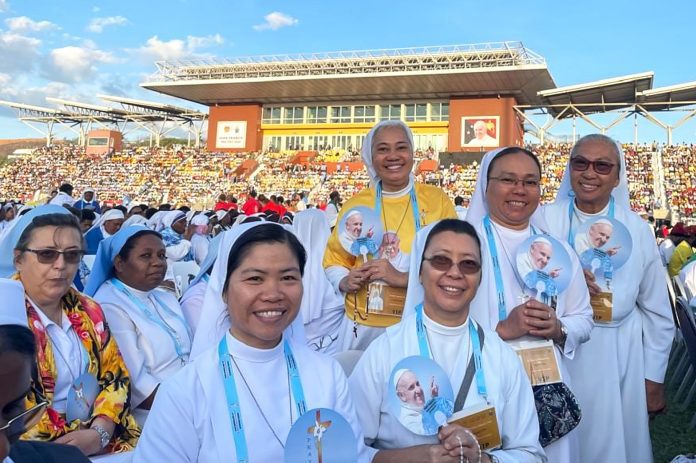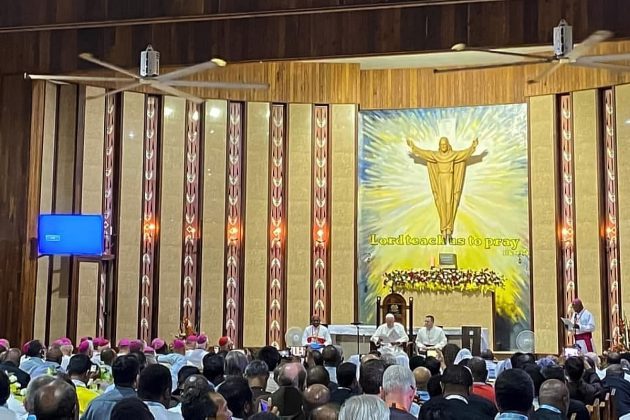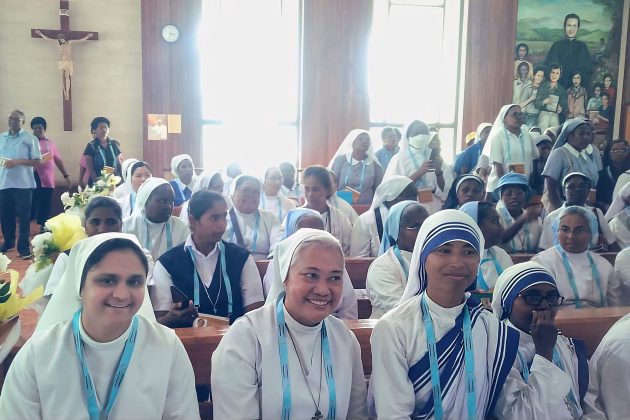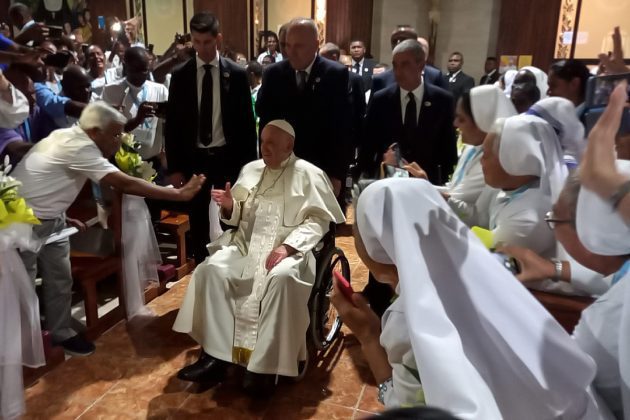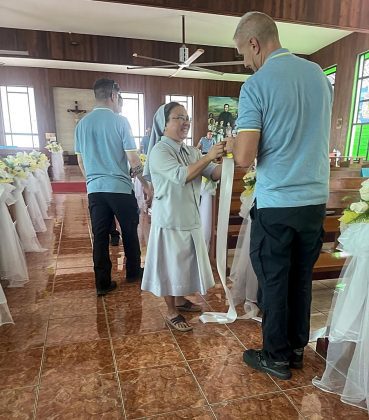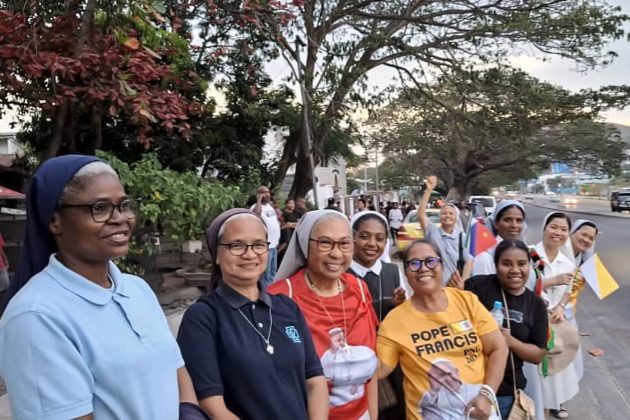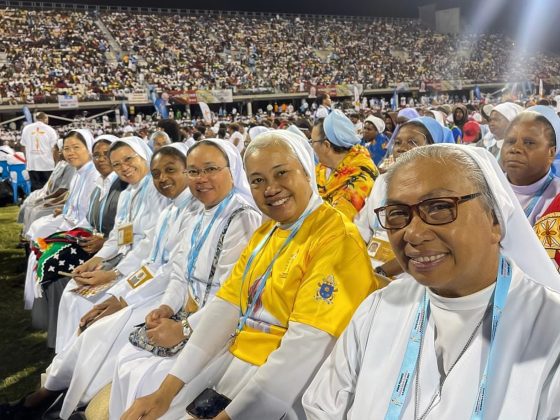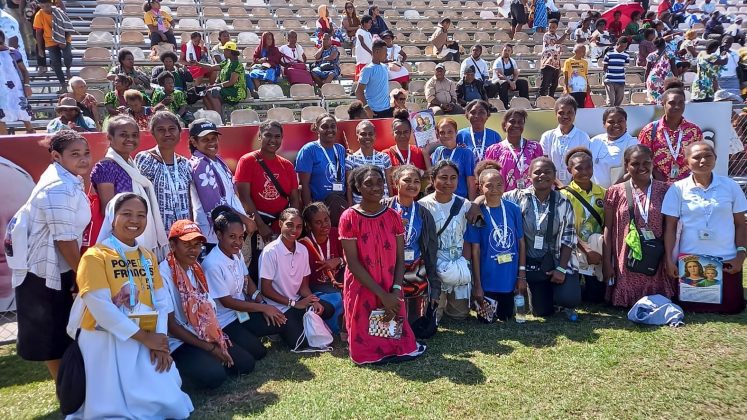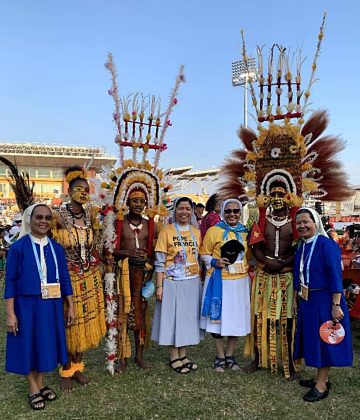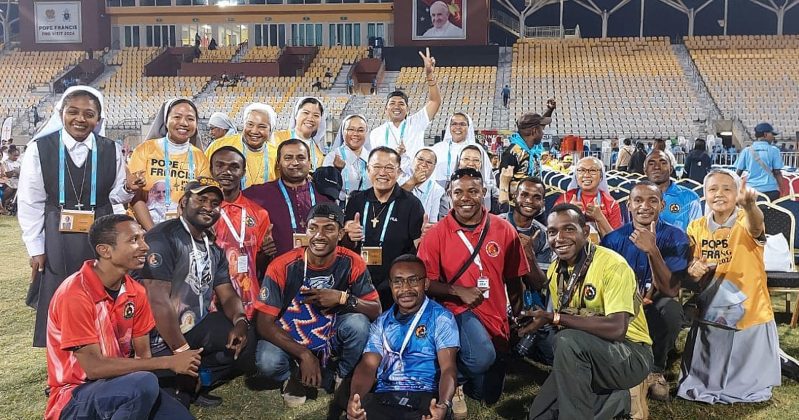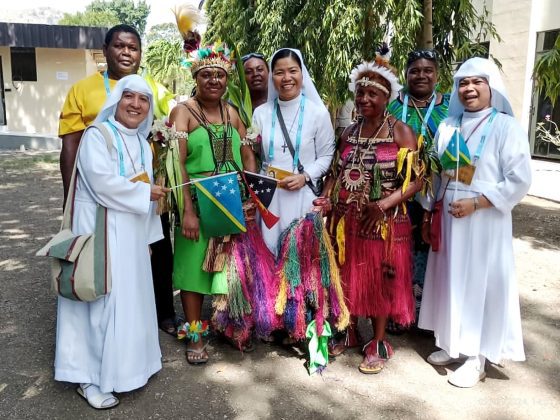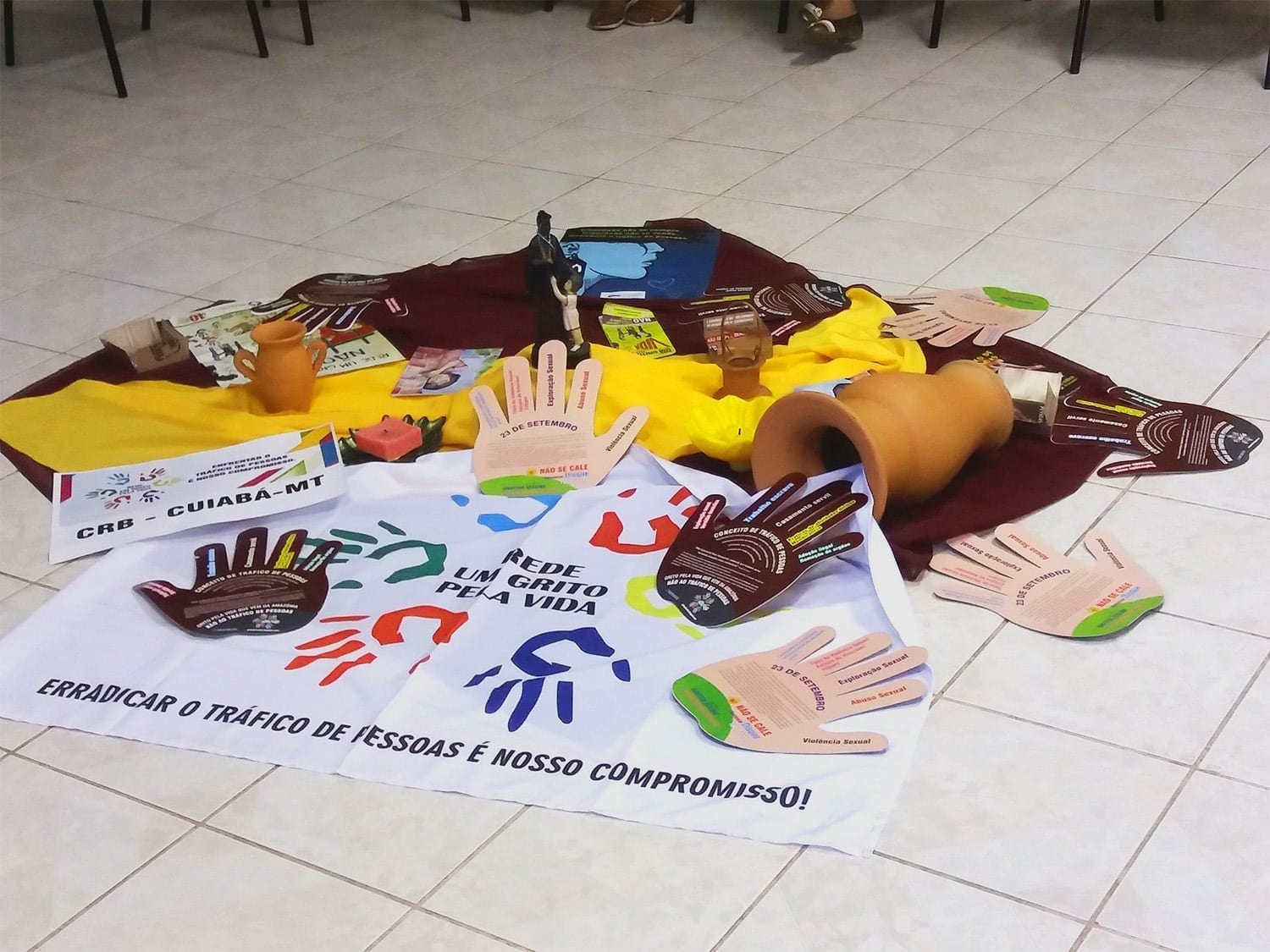Port Moresby (Papua New Guinea). From 6 to 9 September 2024, in the 2nd stage of his 45th apostolic journey, after leaving Jakarta and the Indonesian population, Pope Francis is a messenger of peace, fraternity, and hope in Papua New Guinea.
In Mary Help of Christians Shrine of Port Moresby, where on 7 September the Pope met with bishops, priests, deacons, consecrated men and women, seminarians, and catechists, the Daughters of Mary Help of Christians of St. Mary D. Mazzarello Province (FIL) could not be absent. They collaborate with the Salesians of Don Bosco in the parish and at Don Bosco Technical Institute in the education of young Papuans, and manage and animate the hostel with 120 female students. For the occasion, the Shrine was decorated by the FMA and the Salesians with the students and staff.
After the testimonies, the Pope began his discourse recalling its Salesian origins. “This is a diocesan Shrine dedicated to Mary Help of Christians. Mary Help – I was baptized in the parish of Mary Help of Christians in Buenos Aires, a title so dear to St John Bosco. Mary ‘Helpim’, as you affectionately invoke her here. When in 1844, Our Lady inspired Don Bosco to build a church in her honor in Turin, she made this promise, ‘Here is my house, from here my glory’. (…) So the beautiful Shrine in which we find ourselves, which is inspired by that story, can be a symbol for us, particularly in reference to three aspects of our Christian and missionary journey, as the testimonies we heard have underlined: the courage to start, the beauty of being here, and the hope of growing.”
On 8 September, still in the middle of the night, the FMA, with about forty girls from Mary Help of Christians Technical Institute, reached Sir John Guise Stadium, crowded with people. There they waited for the Holy Father for the Eucharistic Celebration. “The Lord also says to you today: ‘Courage, do not be afraid, Papuan people! Open yourself! Open yourself to the joy of the Gospel; open yourself to the encounter with God; open yourself to the love of your brothers and sisters’. Let none of us remain deaf and mute before this invitation,” he said in the homily of Sunday Mass. And again, “Open yourself! This is the most important thing: to open ourselves to God, to open ourselves to our brothers and sisters, to open ourselves to the Gospel and make it become the compass of our life.”
In the Angelus he then invoked the Virgin Mary with the titles of Help of Christians and Queen of Peace. “I entrust to her the journey of the Church in Papua New Guinea and the Solomon Islands. Mary Help of Christians – May Mary Helpim accompany and protect you always: strengthen the union of families; make beautiful and courageous the dreams of young people; support and comfort the elderly; comfort the sick and suffering! (…) Mary Helpim, Queen of Peace, help us to convert ourselves to the designs of God, which are designs of peace and justice for the great human family!”
In the same stadium the next day, the FMA with students of the school and hostel lived another particularly significant moment. It was the meeting of Pope Francis with the young people that took place in a festive atmosphere, where the vibrant colors of traditional clothing, music, and local dances paid tribute to the rich culture of the Country. This celebration of identity and diversity highlighted the importance of the Pope’s message of unity, demonstrating how faith can serve as a bridge between different communities. The testimonies were also very engaging, touching many young people’s realities that are sometimes dramatic, but keeping alive the hope and desire to face the challenges.
The central message in the Discourse of the Popa – “Be wantok of love” – resounded loud and clear among the thousands of young people gathered in the stadium. In a Country characterized by profound cultural and linguistic diversity, Pope Francis urged young people to become ambassadors of love and reconciliation, capable of transforming the future of their land. He invited them to learn to speak “the language of love”, an appeal that has taken on a particularly deep meaning in a context such as that of Papua New Guinea, often marked by tribal conflicts and violence. The term “wantok” – which in Tok Pisin language represents “a group of people with whom we share language and bonds” – has become the symbol of a universal message: to be united in love, overcome divisions and build a future of peace.
Jessica Isufu, a young collaborator and former student of the female hostel run by the FMA in Port Moresby, shared: “Pope Francis was a great witness. Despite his age and health conditions, he sacrificed himself to reach the distant ones. He was eager to meet, greet, and talk with his smile for everyone. He really brought everyone together in their enthusiasm to see him up close, to touch him, and to talk to him.” For the Papuan population, seeing Pope Francis arrive, who lives more than 14,000 kilometers away, was in fact an unimaginable event, almost miraculous, a unique experience, lived with a deep sense of wonder and gratitude. Young and old welcomed him with emotion, as if in his words and gestures they could perceive Christ Himself among them.
The preparation and progression of events related to the papal visit created a climate of collaboration that deeply touched the religious and educative community. The Sisters and educators involved in the organization share their reflections:
“Pope Francis embodied what he spoke to us in his meetings: the compassion, tenderness, and closeness of God,” commented an FMA involved in the organization. “His human and compassionate nature, combined with a strong sense of humor, enabled the young people to accept his message and recommendations, even when it came to facing difficulties and recovering from sin. He is indeed a holy man who points to God for us.”
“The three grace-filled days demonstrated a natural bond between Pope Francis and the young people, who listened carefully to his words. He said that it is normal to make mistakes, but the important thing is to get up and help others do the same,” says another member of the educating community.
A new missionary called the visit a “special grace” to begin her mission in Papua. “I heard the voice of God speaking directly to me through the mediation of Pope Francis. The meetings with him were moments of blessing and gave me new hope and courage to work with and for the beloved children of God in this humble land”.
One aspect that deeply impressed those who met Pope Francis was his simple and welcoming attitude. “The visit was truly extraordinary. It impressed me with its simplicity and concreteness. I was very impressed when he said that, despite the 800 dialects of the Country, it is possible to create friendship and love among all, and live this love in the families and in the communities.”
“His visit had very Salesian characteristics: spontaneity and familiarity. The Pope is generous in responding to greetings and gestures of friendship and appreciation from people,” added the Salesian Sisters. “He is a true shepherd who is close to his flock. His holiness is tangible and transmitted to us tenderness, closeness, and compassion.”
And also, “His visit was a confirmation of the joy and beauty of being Catholic. The Pope has shown that the Church listens and reaches out to everyone in the peripheries. His coming has favored the unity and collaboration of different people who are linked by the experience of God through the Pope as the Vicar of Christ.”
The Pope’s appeal has already been accepted by many young people. “I have received a very great blessing and I wish to accept the challenge of being ‘wantoks’ of love, who gather all those who fall and, if they have fallen, to rise up and start again in order to help others live renewed.”
“Let us ask the Spirit, who has filled our hearts with joy and gratitude, to guide our feet to walk, to live concretely the call to forgive and build peace starting from our homes and villages, communities and cities,” is the desire for commitment and conversion that flows from our hearts.
The words spoken at the beginning of this meeting are also a farewell from this land full of hope, before we set out on our way to reach East Timor:
“I am happy for these days spent in your Country, where sea, mountains, and tropical forests coexist; but above all a young Country inhabited by so many young people! And the young face of the Country we could all contemplate, even through the beautiful representation that we saw here. Thank you! Thank you for your joy, for how you have narrated the beauty of Papua where the ocean meets the sky, where dreams are born, and challenges arise. And above all, thanks because you have sent out to everyone an important wish, ‘face the future with smiles of hope! With smiles of joy. Dear young people, I did not want to leave here without meeting you, because you are hope for the future.”




